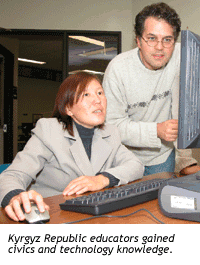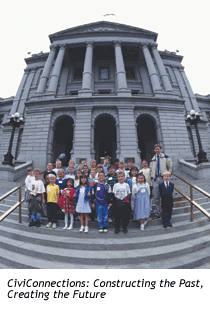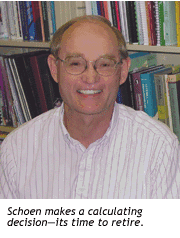|
CURRICULUM
& INSTRUCTION
Developing
Civic Education in the Kyrgyz Republic
 Samara
Yuldasheva listened in wonder as students from the Iowa City
Senior High Alternative Center explained why they chose that
school over a conventional high school. She said there’s
no such thing as an alternative high school in her country,
the Kyrgyz Republic. Samara
Yuldasheva listened in wonder as students from the Iowa City
Senior High Alternative Center explained why they chose that
school over a conventional high school. She said there’s
no such thing as an alternative high school in her country,
the Kyrgyz Republic.
“ If you can’t get along in a regular classroom,
you’re kicked out, and you get no education,”
she said. “But we are a developing democracy. I think
in the future we will have options like you have here.”
Yuldasheva, an English teacher in the Kyrgyz Republic, which
borders China and was once part of the Soviet Union, was one
of eight educators from that country who visited the College
of Education for five weeks last fall. They were here to see
how American students learn to be democratic citizens. Social
Studies Education Associate Professor Greg Hamot
organized the visit along with Helen Finken, former social
studies curriculum supervisor for the Iowa City Community
School District.
Hamot has been involved with similar civic education projects
for 12 years. He’s worked with educators from the Czech
Republic, Armenia, Bulgaria, and more.
“It’s rewarding to work with these groups, to
know that when students start to become better democratic
citizens, our projects might have something to do with that,”
he said.
Through their visit, the Kyrgyz educators created lesson plans
related to topics in civic education and interacted with Iowa
City educators. When they returned to the Kyrgyz Republic,
they led workshops to teach what they learned to other educators.
“This is important for us because unfortunately there
is no such thing as civic education in our country,”
said Elena Timchenko, an English teacher in the Kyrgyz Republic.
“We are here to experience this type of education and
then spread it among the citizens in our country.”
Besides improving education in developing nations, Hamot sees
a bigger purpose for the project.
“There’s a theory in political science that democracies
rarely ever go to war with each other,” Hamot said.
“Whatever I can do to help other democracies become
more solid is a contribution to that theory—hopefully
there will be more cooperation between them.” –
by Heather McElvain
Science
Education Technology Sparks African Education
When Science Education Professor
Robert Yager was asked to direct a project
to help prepare math and science teachers-in-training to teach
more effectively, he was delighted to accept. What makes the
project particularly challenging is the fact that the teachers
live and work halfway around the world—in seven African
countries.
Thus, Yager and his collaborators, Science Education Lecturer
John Dunkhase and Grant Wood AEA math consultant Vicki Burketta,
not only are designing the training, but also are perfecting
their distance teaching skills.
The UI educators are working with teachers in Ethiopia, Ghana,
Kenya, Namibia, Nigeria, South Africa, and Uganda. In each
country, a ministry of education official or college science
educator serves as the facilitator to help train 20 science
or math education students using a CD designed by Yager and
his colleagues and created by Doug Allaire,
a multimedia specialist at the College’s Education Technology
Center.
The CDs, which include reference material, video segments,
teaching activities, and assignments, are targeted to the
specific cultures of each area in Africa. The African teachers
use the materials in their home schools and then gather at
national sites to evaluate the project and interact with Yager
and his colleagues via distance communication.
“During the workshops,” Yager says, “our
staff meets each day to discuss via email the questions and
issues sparked by the CDs we have provided the teachers and
national facilitators. All the interaction is through web
connections, the instructional diskettes, and email discussion
groups.”
Funding for the project is provided by the Africa America
Institute (AAI) in Washington, DC, which helps develop vocational
and general educational training in developing nations. AAI
actively encourages education through distance learning technology
and has worked closely with media organizations such as the
Discovery Channel.
AAI sought Yager’s input because of his background in
staff development and the international attention drawn by
the hundreds of Chautauqua-style education workshops he has
organized during the last quarter-century.
“With this kind of program, everyone gains,” he
adds. “We can continue to study exemplary staff development
practices and distance learning. Doctoral students can participate
in the workshops and evaluate their effectiveness. And, of
course, we learn more about education in other countries while
their teachers learn more about us.” – by
Jean Florman
Linking
History, Service, and Civics
 It's
one thing to read about American history. It's another to
make it. It's
one thing to read about American history. It's another to
make it.
As ambitious as it sounds, that's what University of Iowa
education professor Rahima Wade wants social
studies teachers and their students to accomplish through
a national, federally funded program called CiviConnections:
Constructing the Past, Creating the Future.
Under the three-year, $1.047 million grant from the Corporation
for National and Community Service (which also runs the national
AmeriCorps and school-based Learn and Serve service programs),
teachers across the country in grades three through 12 can
apply for a limited number of grants to help them integrate
local historical inquiry into their classrooms.
Wade, Ed.D., professor in the College of Education's Curriculum
and Instruction Department, wrote the winning grant-proposal
on behalf of the National Council for the Social Studies (NCSS),
the actual grant recipient, and will serve as the project's
director and evaluator. The NCSS proposal was one of just
seven proposals chosen for funding in a new 2003 grant competition
called "Linking History, Civics, and Service."
Wade said teachers will not just talk about history; they'll
lead their students in developing solutions for social problems
in their communities and then put those ideas to work.
Take the issue of homelessness, for example. The teachers
and students would research the history of the problem locally,
examine national data, explore contributing factors such as
the Great Depression and then develop a service-learning project
that seeks to address the problem. Activities might include
working in a soup kitchen or crisis center, collecting winter
clothing or holding a fundraiser.
"The notion here is that we all are history-makers,"
Wade said. "They learn about history, then become part
of making it themselves."
In May 2004, 33 teams of three teachers from schools or districts
will be awarded grants of $7,500. The money will cover the
cost of their attendance at a workshop next summer, attendance
at the NCSS annual meeting in November 2004, and support costs
and funding for expenses related to their particular school
projects, such as transportation or the purchase of curricular
materials.
A smaller, select group of teachers will be chosen from among
the first year's participants to serve as mentors for the
second and third years of the grant.
When the individual projects are completed, the classes will
be expected to coordinate a community-wide celebration, giving
presentations in their schools, civic centers or other community
venues. The projects will also be reported on in publications
produced through the grant.
For more information about the CiviConnections project, visit
the NCSS website at www.ncss.org/civiconnections.
For information about how to apply for a grant, e-mail civiconnections@ncss.org.
– by Stephen Pradarelli
It’s
Been a Pleasure
 Mathematics
Education Professor Hal Schoen, the College’s
first chair of the Curriculum and Instruction division, is
retiring after 30 years at The University of Iowa. Mathematics
Education Professor Hal Schoen, the College’s
first chair of the Curriculum and Instruction division, is
retiring after 30 years at The University of Iowa.
Schoen, who was the first in his extended family to earn a
bachelor’s degree, came to The University of Iowa in
the fall of 1974 to take an associate professorship in mathematics
and education. Since the 1970s, Schoen has had a major impact
on The University of Iowa.
Schoen designed the Mathematics Tutorial Laboratory (MTL)
and served as the lab’s first director from 1979 to
1982. The MTL offers a place for undergraduate students to
go for help with their math coursework.
“I’m pleased that the MTL has helped tens of thousands
of students over the years,” he said.
From 1990 to 1993, he chaired the College’s Curriculum
and Instruction division.
Schoen said he was proud of his work as chairman.
“ Best of all, from my perspective, is that we hired
excellent new faculty members in several program areas,”
he said.
Schoen also served as an advisor for dozens of doctoral students.
He was Eric Hart’s doctoral advisor in the 1980s. Hart
said the experience was a complete pleasure.
“ Hal helps students capitalize on their own interests
and ideas, and at the same time provides enough detailed reviewing
and guidance so that they can focus and make systematic progress
on their work,” Hart said. “He gets students involved
in vital professional work so that they can establish themselves
as members of the profession.”
Schoen’s influence extends beyond the university. He’s
also been active in a number of professional organizations.
He was president of the Iowa Council of Teachers of Mathematics,
co-chair of the American Education Research Association’s
Special Interest Group for Research in Mathematics Education
and a member of the writing team of the National Council of
Teachers of Mathematics’ 1989 Curriculum and Evaluation
Standards for School Mathematics.
Since 1992, Schoen has been co-director of the Core-Plus Mathematics
Project (CPMP).
CPMP involves faculty from several major universities. The
project developed, evaluated, and continues to refine a comprehensive
high school math program.
“ I have always been motivated by the belief that mathematics
can and should be taught better than it often is,” Schoen
said. “Mathematics curriculum should be broadly useful
and understandable to most students, not just those going
on to be engineers, mathematicians, or scientists.”
Schoen will continue to work part time on CPMP activities
after retiring June 30. – by Heather McElvain
|